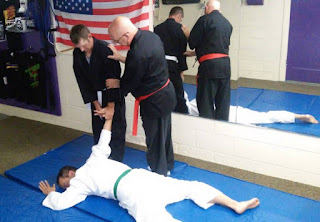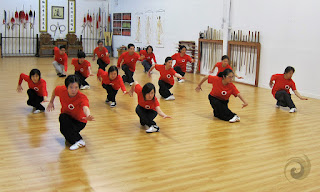By Phillip Starr
Another question posed by one of our senior instructors was about how much or how often one should train. When are we "wimping out?" When is enough really enough?
Naturally, every instructor wants his/her students to train as much as possible and will encourage students to do so at every opportunity. But it really depends on what goals the student has set for him/her self. One who is interested only in getting fit has different needs (and desires) than one who is only interested in self-defense, one who wants to learn the "whole" of a martial art, and so on. I think it's important for each and every student to decide just what it is that he/she wants out of training, and that's not as simple a task as it may sound. Some people don't really know what it is they want. And if you don't know what you want, you certainly have no idea about how to get it!
Even within a given "goal", there are subtle delineations. For instance, let's say that you practice martial arts because you want to get into better physical condition. Period. WHAT, exactly, do you mean by "better physical condition?" Do you want to lose or gain weight? How much? Within what approximate time frame? Do you want to get stronger? How so? What do you mean by "stronger?" You need to be very specific about what it is that you want. If you have no goal, you don't know which road to take.
If your goal is the acquisition of self-defense skills, just what do you mean? Simple self-defense (against simple forms of attack such as grabs, pushes, and punches)? Or more complex things like defense against an armed aggressor? Multiple aggressors?
If you aim to learn "real martial arts", what do you mean? What is your definition of "real martial arts?" It may be different from that of your teacher and this can lead to frustration and discouragement for both of you.
Now, the ideal MINIMUM amount of training for learning classical martial arts requires attending class 2-3 times each week. Naturally, this is not always possible. Many instructors cannot teach class that frequently for one reason or another - but if the teacher can't conduct a formal class that often, then it's up to YOU to make up for it by training on your own (or getting together with classmates at certain times). If the amount of training is reduced, the length of time it will take you to achieve your goal is naturally lengthened substantially. If you train enough on your own to EXCEED three classes weekly, so much the better. Your progress will be significantly enhanced.
I recall a student who approached me years ago and expressed his disappointment. "I'm just not moving along as fast as I want to," he said. "I really try, but it seems like I'm just not going anywhere." I pointed out a couple of things to him..."Well," I began, "You're only coming to class about once a week. Sometimes twice. You're not training on your own, either. You reap what you sow." He didn't much care for my response and he dropped out soon afterwards. Ah, well. As an instructor, I can only do so much. There's no magic pill. Regular, consistent training is the secret. If a student won't do that, I cannot possibly help him/her.
When you draw up a training schedule, be realistic. Don't set a schedule that you cannot or will not follow. But once you draw it up, stick to it, come hell or high water (well, for the most part). I suggest training 6 days a week...but that's for people who want to learn the whole thing. Each workout need not be too awfully long; it depends on how much time is available. My own workout lasts about 90 minutes. Some people have only 30 minutes or less, and that's fine. It's what you put into the available time you have that matters.
Of course, many people cannot train 6 days a week. After all, this is the 21st century and we have jobs, school, and families...many other responsibilities besides training. That's why I say that you have to be realistic. Don't make a schedule that you cannot follow because you'll only frustrate yourself. If you CAN train six days a week and you WANT to do it, then fine. If not, then make a schedule that you CAN and WILL follow. The schedule, whatever it is, has to be regular.
Avoid over-training. You'll burn out. Take your time and be gentle with yourself. Don't over-tax your body and mind. Pushing yourself (gently) is one thing, but beating yourself up is another. But you SHOULD push a bit each time you train...
When are you "wimping out?" I think we all know the answer to that. When you know in your own heart that you're wimping out, then you are. When your reason(s) for not practicing are reasons that you would not accept if you were your instructor, then you know your spirit is starting to weaken. For instance:
*"I had a stressful day." Give me a break. Life is stressful.
*"I have two cracked ribs." OK. Sit down and enjoy the show. Watch the History Channel...
*"I have a sprained wrist." Fine. Do you kick with your wrists? Come on. Stop being a wimp.
*"I have homework." Want to keep your mind sharp? Keep your body sharp. A little training will do more for your schoolwork than you might imagine.
*"I have a migraine." I sympathize. Take a nap.
*"My boss really made me mad." OK. So, go kill the s.o.b. or practice for a while to let off some steam.
*"I don't have enough room to practice at home." C'mon. I lived in a mobile home. Try training in a submarine sometime. If you can stand up, you can practice.
*"I have the shizzling drits." Stay home. Have a peachy night. Eat some cheese.
ad nauseum...
After teaching for several decades, I like to think I've heard every excuse there is, but I know I haven't. I saw one guy come to class on crutches because he'd been in a motorcycle wreck and broken his leg. He sat on the floor and practiced hand techniques! One of the students here broke his big toe (a really NICE job, too) but never missed a class. John Morrow, one of my oldest students, used to hitch-hike (with his friend) 25 miles to class (and then back home again) three times a week! Mark Hachey maintained a 4.0 grade point average in nursing college while training for several hours each day. Another student used to travel to Omaha from Lincoln (50 miles each way) to attend class.
And then I've had students miss or stop training because their spouses (or significant others) didn't like it, because they forgot their training shoes, because it was raining...
If you want to achieve anything in this life, it's going to require some effort and sacrifice. The most valuable things are things which cannot be handed to you; they're things which you must get for yourself (although someone may help you along).
It's easy to become distracted. This is why you have to set realistic goals (and WRITE THEM DOWN!), realistic training schedules (DITTO), and then stick to them. Over the years, I've had probably hundreds of students who could have made it, but who gave in to distractions or refused to make the small but necessary sacrifices.
A really common situation involves a spouse who doesn't understand why or what you're doing...I hope I'm not stepping on too many toes here, but this really is a common problem and has been the end of many a promising (martial arts) career. Let me begin by saying that family is more important than anything else. Never sacrifice your family for martial arts.
But...
A married couple consists of two different human beings. Now, I'm certainly no marriage counselor but I feel that I know something of this subject :-) So. Each of us has a life which is necessarily separate from our spouse or significant other. We have to. It is simply not possible to include a spouse in 100% of everything we do and even if it was possible, it would be terribly unhealthy for the relationship.
I have known many people whose spouse demanded that he/she spend every free minute with him/her/the family. This suggests to me that the spouse in question has some psychological issues regarding feelings of security and inadequacies...and such relationships often do not last. Each of us needs time to him/her self on a regular basis. This is, I think, essential for good mental health as well as for building a nurturing, trusting, and strong relationship.
We need to give each other the time and space to be ourselves and if one of us likes to practice martial arts as a way of improving ourselves, so much the better. Both parties will benefit from the effort, even if only one is practicing martial arts.
When a student comes to me and says that his wife or her husband doesn't want him/her to attend class or practice at home, it places me in a most difficult situation. Naturally, my initial response is to help my student...but I often have to hold my tongue in check so as not to offend anyone. But now that I'm older, I'm less inclined to bite my tongue. The fact is that if one's spouse discourages participation in training, it can seriously damage the relationship...and where does it end? What if you took up basket-weaving? Would you be discouraged from doing that as well?
The fact is that we all train so as to improve ourselves. This is done not only for ourselves, but for our families as well. If we are in better physical, mental, and emotional shape, our families can only benefit from it.
If my wife wanted to attend a quilting class, that would be fine with me. She ran a small aerobics class after hours in my school in Omaha (after I had come home from the school), and that was fine. I allowed her to be herself and to do the things that made her happy (except for painting my bathroom a God-awful purple). If she was happy with herself, I benefited from it.
As I mentioned earlier, you must be very specific about your short and long-term goals. You must know WHY you're training and what you intend to get out of it. Feel free to show it to your instructor as it will greatly assist him in evaluating your needs and helping you to achieve your goals.
At the same time, be realistic. If you only train once a week, you will not make it to black belt within a year! If a black belt is what you want (or rather, the skill and knowledge that comes with it), then discuss it with your teacher. If you intend to go beyond a mere first-grade black belt, sit down with your instructor and talk about what you need to do. That's what he's there for and it's it's what he wants and needs for you to do. Don't force him to guess at what you want. Let him know where you plan to go with your training. If YOU don't know where you're going, he won't, either...and he can't be of much help.
A word about over-training. If your body begins to show telltale signs of wear and tear from too much "youthful enthusiasm" (as one of my teachers used to call it); that is, "over-training", then you need to back off on the gas a bit. Take your time. Give your body and mind time to digest everything. Don't gulp your food. Savor it.


.jpg)


























No comments:
Post a Comment